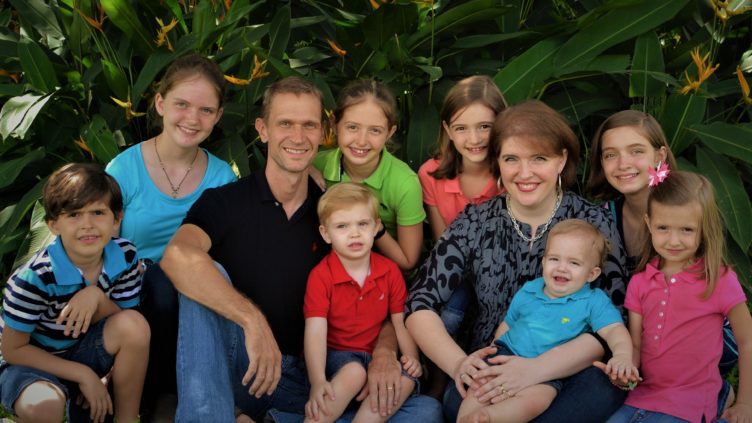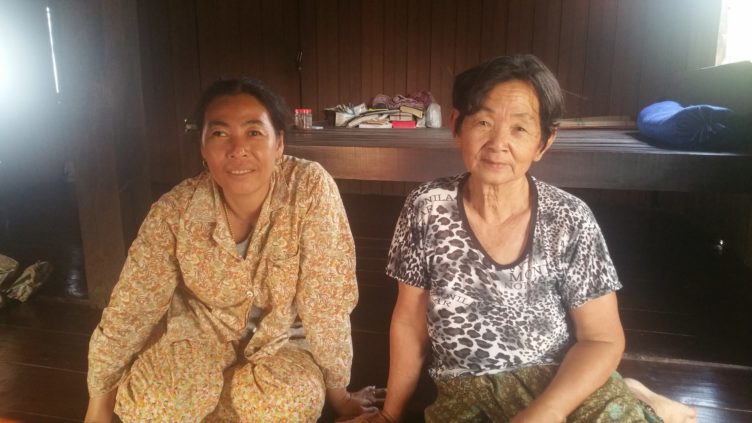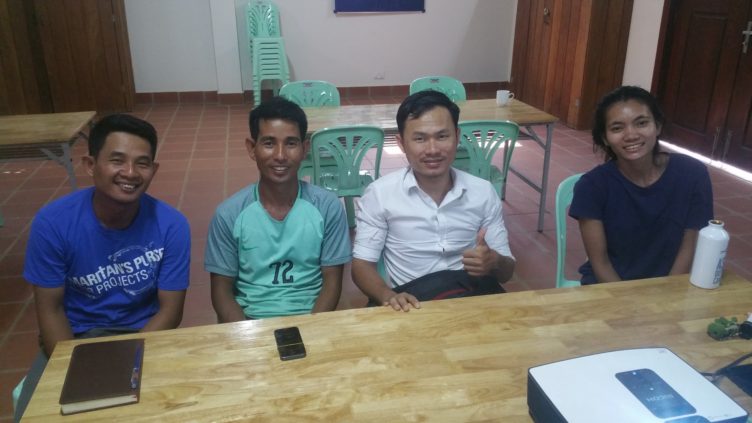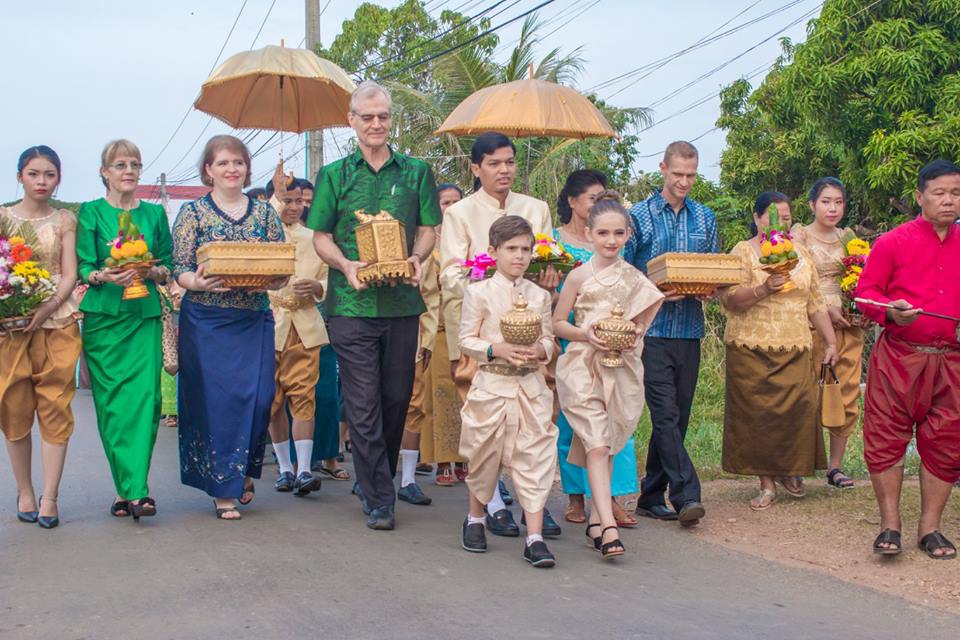Please join me, dear friends, in praising the Lord and in asking him for additional help and blessing.
Answers to your prayers …
 I just returned from Phnom Penh with ten 1-year visas in hand, as well as an agreement with a sister organization that is helping us obtain these for the next few years. Praise the Lord for this answer to your prayers.
I just returned from Phnom Penh with ten 1-year visas in hand, as well as an agreement with a sister organization that is helping us obtain these for the next few years. Praise the Lord for this answer to your prayers.
Several months ago, you also began praying for additional teaching opportunities for me here in Stung Treng. For about a month now, I’ve been meeting weekly with two small groups to teach an introductory overview of the Bible. The first group is an elderly lady and her daughter, the only Christians in their village (about 20 minutes from our town). We meet every Tuesday evening. The second group is four young adults, three of whom are new believers and one an interested non-Christian. Praise the Lord for these opportunities and pray for fruit in the lives of these dear people.
- Eng and her mother, Yeng
- Tuu, Rhit, Pi-set, and Moni
And please keep praying
I continue to spend most of my work hours preparing the curriculum for this year’s Pastors School sessions in Ratanakiri. Please pray for me, that I would understand the text of Scripture and be able to communicate its message to my students. My teammate JD who is working with me in this project expressed our goal like this: “to make God big, and the Bible small.” While that first part is transparent enough, perhaps you’re not so sure about making the Bible small. What we mean is that due to its size, age, and cultural distance from us, the Bible can be an overwhelming and intimidating book, particularly the Old Testament. And if we in the highly literate, highly educated West feel this way, how much more our brothers and sisters with limited literacy and formal education. Our prayer is that this material would be a tool by which our students can increasingly access the whole Bible and thereby know the God who reveals himself there.
I am thoroughly enjoying the work of preparing this material … when I can get to it. In recent months, I’ve spent inordinate amounts of time dealing with other necessities such as passports/visas/driver licenses/etc. This, combined with unexpected visits, constant noise, and an earlier-than-last-year hot season, make progress painfully slow. Pray that I will make the best use of the time I have and that I will receive every “interruption” joyfully as from God’s hand.
Pray for peace in Cambodia. As this summer’s national election approaches, the ruling party continues to muscle its way forward by any means necessary. Additionally, US-Cambodian relations are strained at present. Pray for both the population generally, and for us as foreigners residing here, particularly American foreigners. We believe there is yet much work to do before the Cambodian church as a whole can thrive without the assistance of missionaries.
Culture notes
A few anecdotes to inform, amuse, and burden …
The whole neighborhood turned out earlier this month to watch the Super Blue Blood Moon. The neighbors refer to an eclipse as “Rahu [a legendary monster] catches/swallows the moon.” Traditionally, when the eclipse begins, Cambodians bang on their fruit trees and shout, “Help the moon! Help the moon!” The subsequent harvest depends on whether Rahu swallows the moon completely, spits it back out, or perhaps expels the moon sideways! One neighbor said that a pregnant woman must not look at the eclipse or her child will have defects. Another neighbor assured me that these are mere superstitions that Cambodians perpetuate in good fun.
…
- Pi-set and Srey Non
- “Angel Children”
A few months ago, Judson and Salem were the junior attendants (Khmer “angel children”) in our neighbor’s wedding. Then last month, Judson and Eden participated in the wedding of our friends, Pi-set and Srey Non, both committed Christians. I had several opportunities to talk with Pi-set and his mother about differences and similarities between his wedding (as a Christian) and a traditional Buddhist wedding in Cambodia (like our neighbor’s). For the uninitiated westerner, both weddings would appear equally strange. But there were important differences. Most fundamentally, Pi-set and Srey Non had no priests chanting blessings, nor did they make any offerings to ancestors and other spirits, both a staple at any Khmer wedding. While I would consider this the most important difference, it is certainly not what caught the attention of nearly any Cambodian attending the wedding, including the bride and groom. From the guests’ perspective, a wedding in Cambodia is first and foremost an opportunity to get drunk. It’s no secret that Cambodians love cheap beer and lots of it. A “Khme-nglish” proverb here says, “Why to drink if not to drunk?!” In other words, the typical Cambodian simply does not have a category for “social drinking.” So when a Christian decides that his wedding will not include idolatrous offerings or the blessings of pagan priests, no one seems to care. I asked Pi-set and his mom about this multiple times—their many non-Christian relatives didn’t mind at all. But to have a wedding with no beer? That was indeed scandalous and a cause for real persecution toward Pi-set and his mother.
…
While I’m thinking about alcohol in Cambodia … This recent article describes the sad lives of waitresses in Cambodia’s thousands of Karaoke clubs. One of the girls interviewed in this piece (named Thyda) first describes the rampant sexual abuse the waitresses endure. Then she says,
I had to drink every day to keep my clients happy, because my duty was to make my clients happy, even though on some days I was sick. I still had to smile and drink …. I was always drunk and I sometimes woke up still drunk, then I’d go to work and have to continue drinking….
Thyda reports having to drink 6-12 cans of beer per day—just to keep her customers happy.
The sexual abuse is indeed tragic and horrifying. But it’s not surprising. Nor is it surprising that customers drink to get drunk. But what I’m still trying to comprehend is the urgency that you join me in my drunkenness; otherwise, I won’t be happy, and it’s your fault! And you must join me in my drunkenness—a beer or two for you is not enough! After 6.5 years in Cambodia and attending many different celebrations (from weddings, to birthday parties, to holiday events), I assure you that I’m not misrepresenting the common mindset. When we drink we must get drunk, and when we get drunk, you must join us—only then are we all happy! Perhaps this impulse stems in part from the strong sense of community for which Asian cultures are well known. Regardless, it does make me appreciative toward the total abstinence of most Cambodian Christians that I know.




